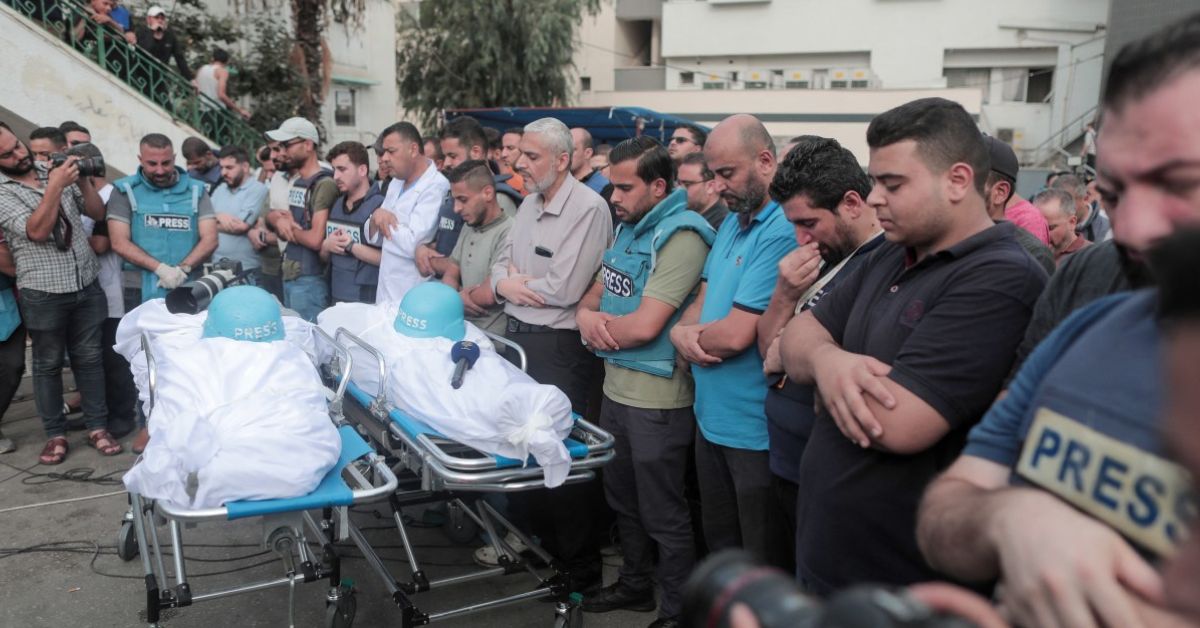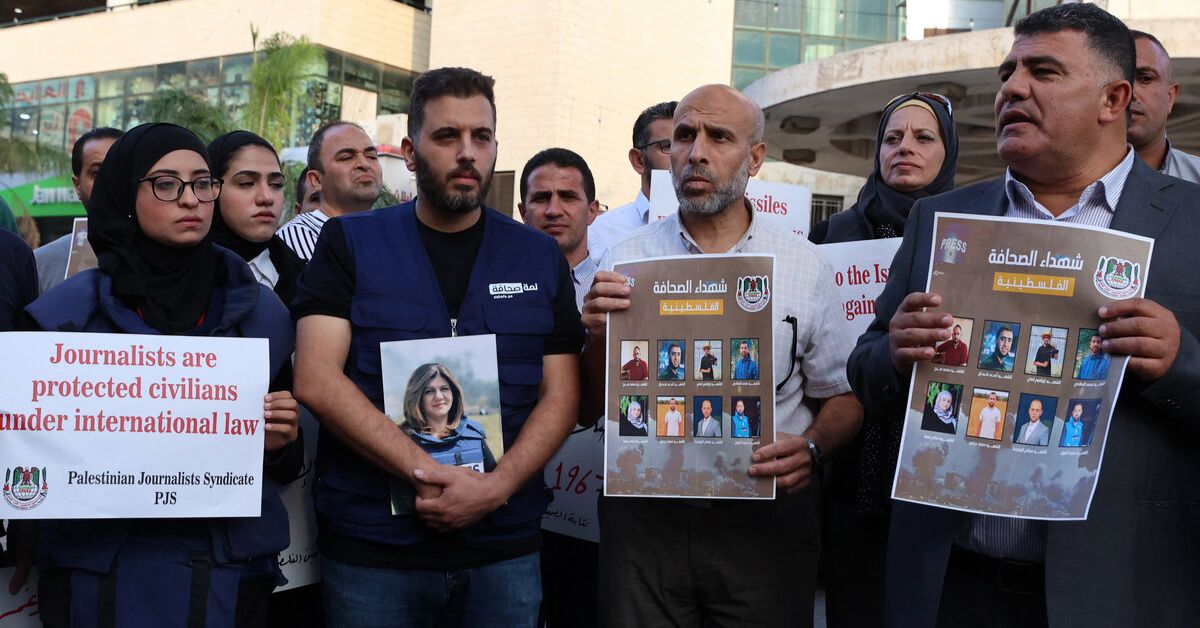GAZA CITY — In the midst of the escalating conflict in the Middle East, journalists find themselves on the front lines, risking their lives to report the truth. The Committee to Protect Journalists (CPJ) has been diligently investigating the rising number of journalists killed, injured, detained, or missing in the war, and the numbers are alarming.
Within just the first eight days of the conflict, at least 12 journalists have been killed, two are missing, and eight have been injured. The war has already claimed over 3,200 lives, with countless others injured. As hostilities spread to neighboring Lebanon, the risks for journalists increase exponentially.
Gaza has become a particularly perilous region for journalists. They face a myriad of challenges, from ground assaults by Israeli troops, devastating airstrikes, disrupted communications, to extensive power outages. In just the initial eight days of the conflict, 10 Palestinian journalists were confirmed dead, with one Israeli journalist killed and another reported missing.
A tragic day in Lebanon
On October 13, a Beirut-based journalist was killed during a shelling attack in southern Lebanon, which also wounded six others. This incident underscores the dangers journalists face, even when reporting from areas not directly involved in the primary conflict.
Journalists Affected in the Middle East Conflict Killed Husam Mubarak - Journalist for Hamas-affiliated Al Aqsa Radio. Killed in an Israeli airstrike in Gaza. Issam Abdallah - Beirut-based videographer for Reuters. Killed during a shelling attack near the Lebanon border. Ahmed Shehab - Journalist for Sowt Al-Asra Radio. Killed in an Israeli airstrike in Gaza along with his family. Mohamed Fayez Abu Matar - Freelance photojournalist. Killed during an Israeli airstrike in Rafah city. Saeed al-Taweel - Editor-in-chief of Al-Khamsa News. Killed in Israeli airstrike in Rimal district. Mohammed Sobh - Photographer for “Khabar” News Agency. Killed in Rimal district airstrike. Hisham Alnwajha - Journalist at “Khabar” news agency. Killed in Rimal district airstrike. Assaad Shamlakh - Freelance journalist. Killed in an Israeli airstrike in Sheikh Ijlin. Yaniv Zohar - Israeli photographer for Israel Hayom. Killed during a Hamas attack. Mohammad Al-Salhi - Photojournalist for Fourth Authority news agency. Shot dead near a Palestinian refugee camp. Mohammad Jarghoun - Journalist with Smart Media. Shot in Rafah city. Ibrahim Mohammad Lafi - Photographer for Ain Media. Shot at the Gaza Strip’s Erez Crossing. Detained Nidal Al-Wahidi - Palestinian photographer for Al-Najah channel. Initially reported missing but later found detained by the Israeli army. Missing Haitham Abdelwahid - Palestinian photographer for Ain Media. Roee Idan - Israeli Ynet photographer. Feared taken hostage with his daughter. Injured Thaer Al-Sudani - Journalist for Reuters. Injured in southern Lebanon. Maher Nazeh - Journalist for Reuters. Injured in southern Lebanon. Elie Brakhya - Al-Jazeera TV staff. Injured in southern Lebanon. Carmen Joukhadar - Al-Jazeera TV reporter. Injured in southern Lebanon. Christina Assi - Photographer for AFP. Injured in southern Lebanon. Dylan Collins - Video journalist for AFP. Injured in southern Lebanon. Ibrahim Qanan - Correspondent for Al-Ghad channel. Injured by shrapnel in Khan Yunis. Firas Lutfi - Correspondent for Sky News Arabia. Assaulted by police in Ashkelon.
Sherif Mansour, CPJ’s Middle East and North Africa program coordinator, emphasized the importance of journalists during such times. “Journalists are civilians doing important work during times of crisis and must not be targeted by warring parties,” he said.
He highlighted the sacrifices journalists make to cover such crucial events and urged all parties to ensure their safety.
The lives lost
Among those killed were Husam Mubarak, a journalist for the Hamas-affiliated Al Aqsa Radio, and Issam Abdallah, a Beirut-based videographer for Reuters. Both lost their lives while covering different aspects of the conflict.
On October 12, Ahmed Shehab, a journalist for Sowt Al-Asra Radio, was killed in an Israeli airstrike, along with his wife and three children. The following days saw the deaths of several other journalists, including Mohamed Fayez Abu Matar, Saeed al-Taweel, Mohammed Sobh, Hisham Alnwajha, Assaad Shamlakh, Yaniv Zohar, Mohammad Al-Salhi, Mohammad Jarghoun, and Ibrahim Mohammad Lafi.

Detentions and the missing
Nidal Al-Wahidi, a Palestinian photographer, was initially reported missing but was later found to have been detained by the Israeli army. Haitham Abdelwahid, another Palestinian photographer, remains missing. Roee Idan, an Israeli Ynet photographer, is also missing, with fears that he and his young daughter may have been taken hostage.
Injuries and assaults
Several journalists have been injured while covering the conflict. Ibrahim Qanan, a correspondent for Al-Ghad channel, was injured by shrapnel in Khan Yunis, while Firas Lutfi, a correspondent with Sky News Arabia, was assaulted by the police in Ashkelon.
The way forward
The rising number of journalists affected by the conflict underscores the importance of their role in society and the dangers they face. Their stories, sacrifices, and dedication to the truth are a testament to the power of journalism. As the conflict continues, it is crucial for all parties involved to recognize the importance of journalists and ensure their safety. The world relies on their reports to understand the complexities of such crises, and their protection should be of utmost priority.








